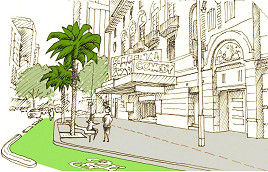Cycling community mobilises in huge democratic showing
The response was swift and effective.
After news that the City of Melbourne had sought to defer the rollout of protected bike lanes in the CBD for the next 12 months, the local cycling community sprang into action.
Word spread quickly online and in short time, submissions opposing the move came in by the hundreds.
By the time the council held its June 7 meeting (just five days after releasing its plans), protestors stood outside Melbourne Town Hall and those willing to address councillors filled the public gallery.
“I’ve been on council for nine-and-a-half years, and during COVID it’s been quite quiet in terms of public attendance at meetings like this. This really feels like a bit of a political reset, and democracy in action,” Cr Rohan Leppert noted at the meeting.
“I think this night will be remembered for the rest of the term.”
From the 1100-plus submissions on the vexed bike lane issue (an unprecedented number), more than 99 per cent were against the council pausing its CBD rollout.
Of those who addressed councillors in-person at the meeting, all 33 spoke in support of the lanes.
And while the significant democratic showing did not sway councillors to vote against management’s recommendation to defer work inside the Hoddle Grid, the episode was not being viewed as a loss by those involved.
“There is one thing in our minds that shone brighter than anything else on the night: the people power,” the Bicycle Network noted on its website after the meeting.
“When the microphones were on and the cameras were rolling, the people riding bikes were there. The show of support for bike lanes may have helped to avoid moves to rip up existing lanes.”
Despite the fact that more than 99 per cent of these people disagreed with their position, the council might have been quietly pleased with the level of response.
It is consistently urging feedback and democratic involvement at the grassroots level, and on this issue, it came in spades.
The Transport Workers Union and business body the Victorian Chamber of Commerce have both been vocal opponents of the council’s bike lane rollout in the CBD, however, did not make a submission nor speak on the evening.
Both have been particularly critical of the Exhibition St lanes, and Chamber chief executive Paul Guerra has recently called for their removal.
However, one significant business on the street who did speak at the June 7 meeting strongly backed the rollout.
Jesse Cain, director of theatre and production at Marriner Group — which owns four of the major theatres in the CBD — said the bike lanes had been a welcome addition to the theatre district on Exhibition St.
“The theatres are magnet businesses that encourage city visitation,” he said.
“Between Her Majesty’s Theatre and the Comedy Theatre, both on Exhibition St, on any given night up to 2700 patrons can be attracted in the city, which is in addition to hundreds of theatre workers and any number of people visiting hotels, restaurants and bars around the precinct.”
These people are not and never have been all parking on the street. The removal of on-street parking has had zero detrimental impact on our business. What the bike lanes have created, by virtue of removing on-street parking and a lane of car traffic, is the significantly increased safety of our patrons and passing pedestrians. There is a much calmer flow of traffic.
A key thread among those who publicly addressed councillors and submitted online was the importance of the protected lanes for safety, and a warning that a pause could halt hard-won momentum over recent years.
But there was another theme that continued to emerge throughout the five-hour council meeting in June.
And that is, a growing frustration that the debate around Melbourne consistently veered towards emotion rather than evidence and data.
One speaker lamented the “unnecessary politicisation of the debate”.
“The Melbourne bike community is not just a small fraction of Greens-leaning people that use their bikes as a pastime,” he said.
“They’re not trendy people looking to buy coffee in stretchy pants as some critics have lampooned. These are work commuters, delivery riders, students, e-bike share-users, scooter users; people of all political persuasions, who may ride a bike because it improves their health, keeps their travel costs down, or simply because they enjoy it.”
While there will be no new protected lanes within the Hoddle Grid before July 1 next year, the council has pledged to focus on lanes north of CBD in the next financial year, namely on Arden St, Macaulay Rd and Royal Parade. •

Council endorses office tower at Flinders Lane despite querying car park demolition



 Download the Latest Edition
Download the Latest Edition